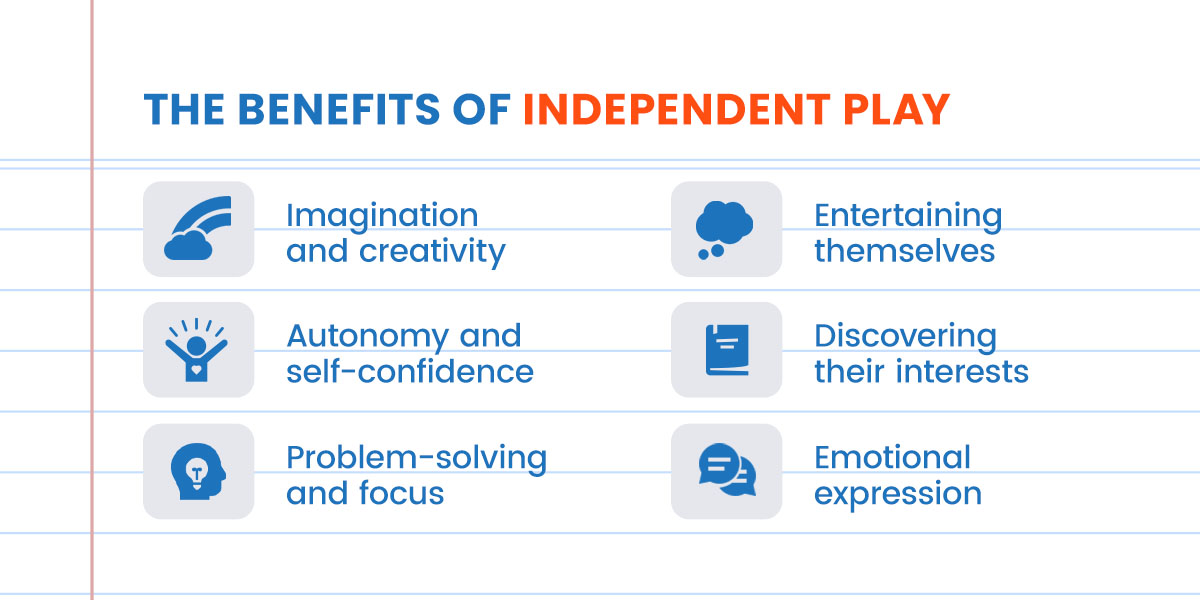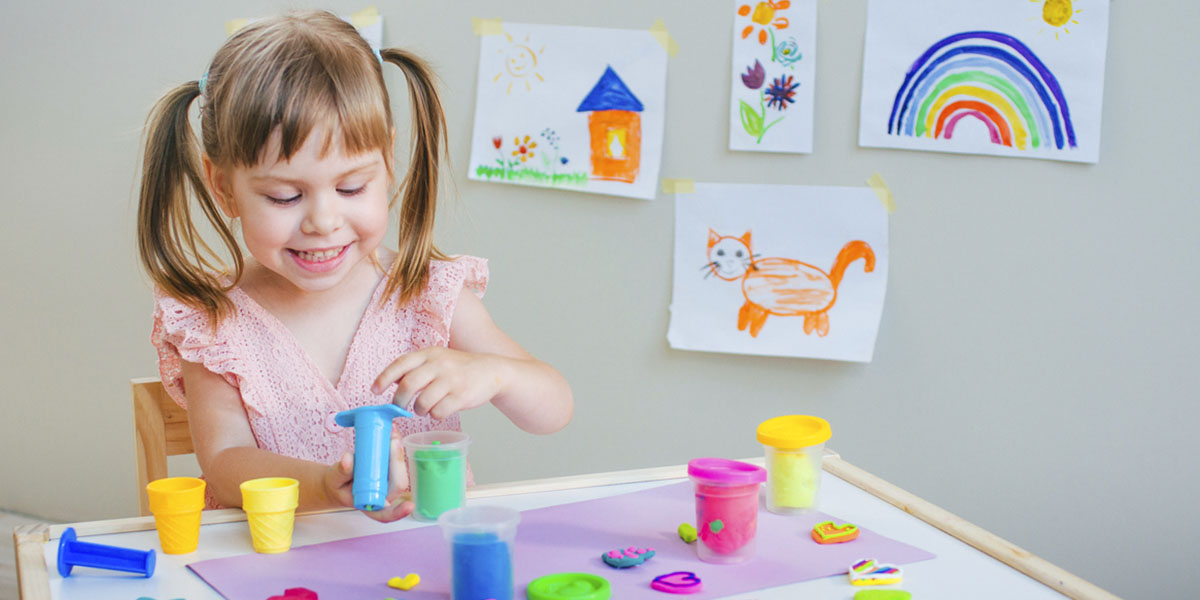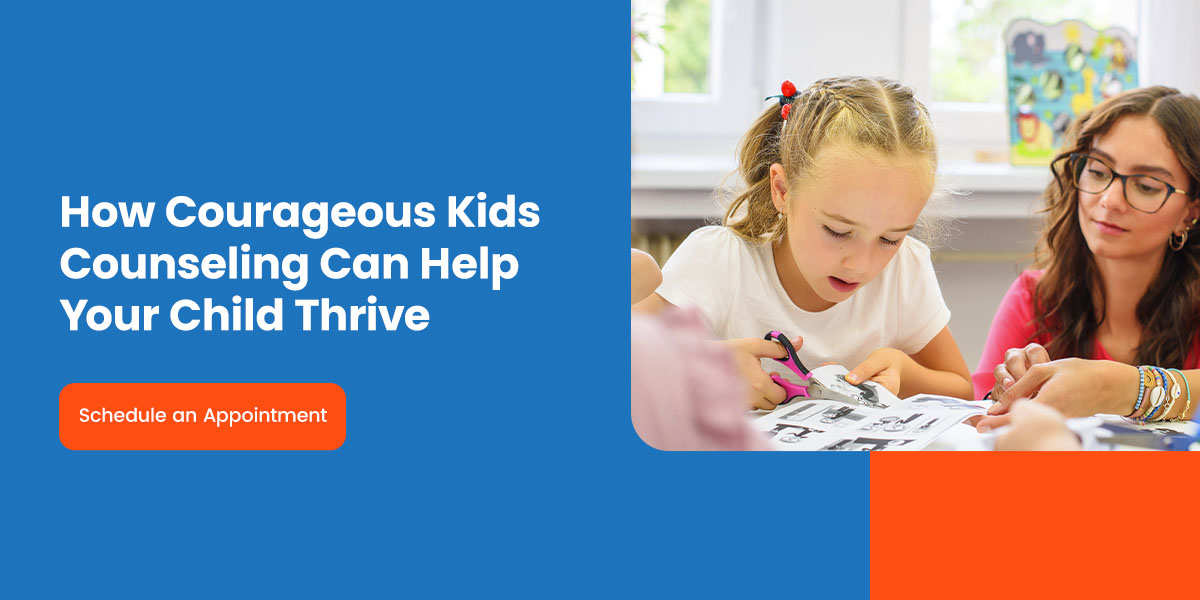Table of Contents
The Developmental Benefits of Your Child Playing Alone
Play is a crucial part of early childhood development. Through play, children learn invaluable lessons about themselves, their world and how to navigate it safely. Although we often think of play as a group activity, solitary or independent play is a cornerstone of learning, too. Discover the benefits of your child playing alone, why it’s such a critical step in growing up and how to help your child make the most of their independent play.
What the Different Stages of Play Look Like
As children grow and develop, the way they play changes. Every child and situation is unique, so every individual experiences the stages of play at their own pace, and that’s perfectly normal. However, it’s still helpful to examine five types of play that children generally move through as they age to understand play’s effect on learning, socialization, imagination and self-concept. These five stages are:
1. The Exploratory Play Stage
The first way children play is through exploration, commonly seen between birth and 2 years old. During this stage, infants and toddlers are curious about their surroundings and investigate things around them that pique their interest. Explorative play mainly involves the senses, and your little one will investigate the sights, sounds, tastes and textures of objects around them. This stage is critical for more sensory-motor development.
2. The Solitary Play Stage
By age 2, toddlers generally begin independent or child-led play, such as stacking blocks and playing pretend by themselves. They may be indifferent to or unaware of adults and children around them as they play. This pivotal stage enriches your child’s creativity, helps them practice concentration, teaches them decision-making skills and gives them a sense of agency.
3. The Parallel Play Stage
Parallel play is the first step toward social play and occurs around age 3. It happens when children play alongside their peers without their activities overlapping. They may, for example, each be playing imaginative games with dolls, but neither they nor their dolls interact with one another. Children engaged in parallel play may observe and mimic one another while remaining focused on their own activities.
4. The Associative Play Stage
Around 4 years, many children begin to interact with each other in the associative play stage, learning to share toys and ideas and engaging with one another’s games. The observations and mimicry they learned during the parallel stage become useful here as they build their first friendly relationships and experiment with new ways to have fun.
5. The Cooperative Play Stage
Cooperative play is an advanced play level that children reach at different ages, depending on their unique character traits and experiences. Children negotiate specific game rules in cooperative play and decide on common goals. Conflict is expected during this stage as preschool-age children are actively learning to share, take turns, solve group problems, listen to each other and control their reactions.
The Benefits of Independent Play
Once a child has mastered all five stages of play, they can still return to previous stages. For example, if your first-grade child regularly engages in parallel play, it’s not cause for concern. Many children are naturally more introverted and prefer to play games by themselves. They are still building critical life skills, including:

- Imagination and creativity: Child-led play lets little ones think up weird and wonderful pretend scenarios, rules and goals, teaching them to think outside the box.
- Autonomy and self-confidence: Solitary play helps children take the lead in activities and build trust in themselves and their decisions in a safe environment.
- Problem-solving and focus: Without active guidance, your child will need to develop solutions to play-related challenges using critical thinking and trial and error.
- Entertaining themselves: Addressing boredom independently is a vital skill that young people need to master to enjoy their alone time in childhood and as adults.
- Discovering their interests: Solo play gives your child the space and freedom to try new things and find out which activities and topics they enjoy best.
- Emotional expression: Pretend play is a brilliant opportunity for young ones to try out different communication styles without any real social consequences.
Developing Social Skills Through Play
Children need a healthy balance between independent and cooperative play to build social skills effectively. Although your child can experiment with empathy, language use and body language through imaginative solitary and parallel play, face-to-face interactions are critical for some more complex social skills and emotional development.
Peer Interaction and Its Role in Child Development
Cooperative play encourages children to learn the outcomes of social behaviors like sharing, adhering to rules, compromising, navigating personal space, active listening, body posture, emotional expression and idea-sharing. Seeing their peers react positively to cooperative behaviors can also build self-esteem and confidence in children as they feel accepted and validated by the group.
Strategies to Encourage Cooperative Play
Studies have shown that it’s important to let children direct play themselves to get the most out of their activities. However, as a parent, you can still create opportunities for healthy collaborative play by:
- Organizing child-led play dates with peers of various ages and personalities.
- Setting up a safe and stimulating play like a playroom or playground.
- Giving the group collaborative toys like board games, dress-up clothes and sports equipment.
- Being a good example by sharing, taking turns and communicating effectively.
- Enrolling your child in sports or engaging social clubs like dance or art.
- Giving suggestions or guiding group play if the children lose engagement.
How Play Therapy Offers Emotional Support
Encouraging children to believe they can be self-reliant and solve their own problems is critical for mitigating anxiety and depression, both in childhood and later in life. Independent play is an excellent way for children to practice working through problems on their own in a safe environment. It also lets children have fun and makes them happy — a vital part of a healthy upbringing.
Play therapy uses these notions of self-reliance, resilience and enjoyment to help diagnose and treat mental health concerns in children by creating a safe space for emotional expression and self-discovery. Children can benefit emotionally from play therapy in many ways, including:
- Communicating nonverbally.
- Processing challenging emotions.
- Reenacting and resolving conflicts.
- Building trust with compassionate adults.
- Developing problem-solving skills.
- Expressing themselves freely.
- Learning coping strategies.
- Practicing important social skills.
Childhood Anxiety and Play Therapy
With the benefits of play therapy, children build up an internal locus of control. That means they feel less overwhelmed by the world and all its perceived threats, knowing that they can rely on themselves to solve problems. With play therapy, children can better process the stress that comes with significant life events like moving schools, family tensions, school pressures, illness and peer conflicts, reducing anxiety and fortifying resilience.
When You Should Seek Professional Help for Your Child
If your child has gone through trauma or is showing concerning behaviors like persistent sadness, anxiety, trouble sleeping, appetite changes, difficulty concentrating, a sudden drop in academic performance, sudden social withdrawal, loss of interest in their favorite activities, aggression, self-harm or significant developmental delays, reach out to a specialized child therapist for support, guidance and a customized treatment plan.
How Courageous Kids Counseling Can Help Your Child Thrive
At Courageous Kids Counseling, we’re dedicated to empowering children to reach their full potential and live their most fulfilling, happy lives. Our team of licensed behavioral health technicians takes the time to get to know your child and understand how they learn and grow best. We offer play therapy, cognitive behavioral therapy, trauma therapy and many more specialized services to best support your child’s needs.
To give your child the gift of emotional and psychological support and empower them to overcome life’s current and future challenges, schedule a free consultation with us today, make an appointment or contact us to learn more about what we offer and how we can help you and your child through this challenging time.



